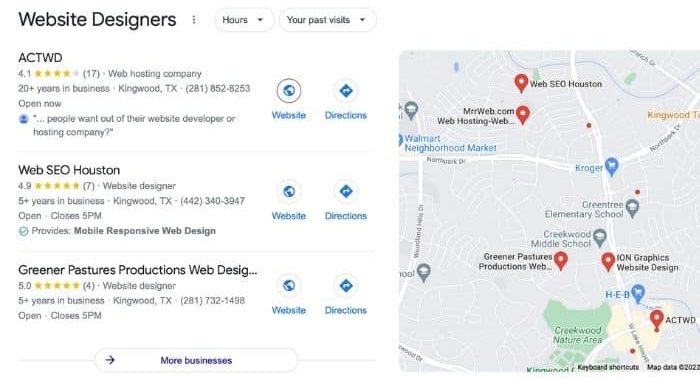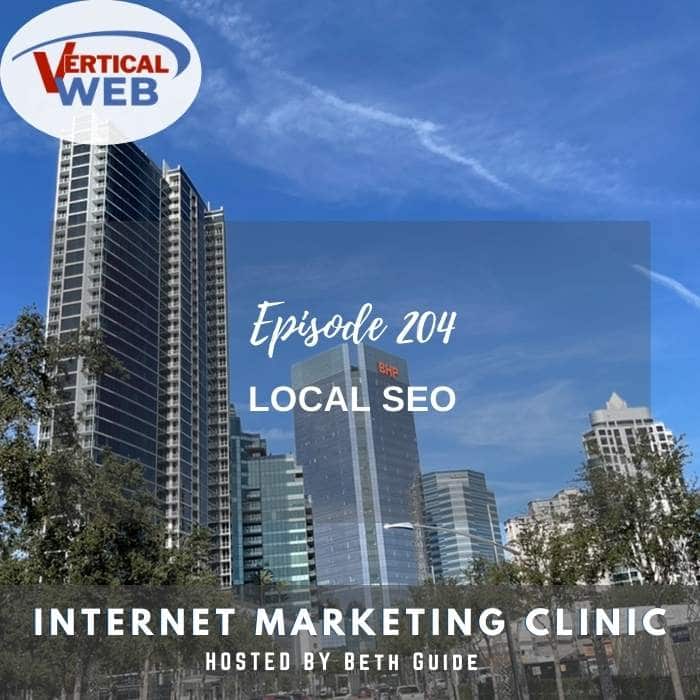Subscribe to Our Podcast Apple Podcasts | RSS
Subscribe to Our Podcast Apple Podcasts | RSS
One of the biggest mistakes I see small businesses make is underutilizing Local SEO practices. If you want your local business to rank better in Google searches, Local SEO is a necessity because it reveals things about your specific location that could have you appearing in a user’s local search.
The key to success is learning what exactly Local SEO is, how to implement it in your own website, how you can support it with Technical SEO, and how the combined effect can impact your business. Let’s walk through it together.
What Is Local SEO?
About ten years ago, Google started plugging map listings into their search results and defining virtually every word in the English language to help them better understand a user’s intent. The result is when a user searches for a term such as “auto mechanic” Google will surmise that they are looking for an auto mechanic, and likely one not far from where they are. Essentially, Google uses proximity searches and word definitions to provide a user with what they hope is the exact information they are looking for.
If there is a map listing on a page, your goal should be to get in that local listing. This is key because the data seems to say that ninety-five percent of people go for the map listing results that appear when they do an online search. Specifically, your end goal should be to reach the top three options in the map listing to help maximize website traffic.
Bottom line? Google is basing the results they provide on the intent of the user, and to do that they are assuming that when the user does a search, they want a local business. If Google doesn’t recognize your business’ address or where you do business, they have no way of knowing if you are local to a user or not, which means you are off the list.

Implementing Local SEO
The best way to let Google know who you are by registering for their Google My Business program and to optimize your website for local searches. This is typically done best through signals such as:
- Google My Business registration. Register your business with Google My Business and take special care to fill out your contact information correctly and as you want it to appear everywhere. List your business’ hours of operation. Never change your phone number because it is connected to your business. Be consistent with how you list the URL of your business, whether that is with the “www” prefix or without it. Know where your Google My Business page points to and try to make a link back to it on the website. Make sure your business description is well-rounded.
- Owner Credibility. If a business is going to appear in the top results of Google’s map listing, Google wants to ensure that it is a valid business and not part of scam. They have some initial hurdles to answer and at times, we have had to submit documentation from the state showing the business is legit. This is a good reason to have all your paperwork in order.
- Physical location information. In the past, Google preferred a physical address to be connected with a business. They now understand all businesses do not necessarily have brick and mortars and will allow a designation of a particular service area. Personally, I still recommend using a physical address if possible because everything is based on proximity. It is also a good idea to use a photo of your office as the cover photo for your Google My Business page.
- Chamber of commerce membership. When you become a chamber of commerce member, it is a signal to Google that you are a legitimate business, and it tells them more about your location. In other words, if you are a Houston Chamber of Commerce member, Google will assume that your business is based in Houston
Ensuring that your business meets guidelines for Local SEO should increase foot traffic, leads from the website, and engagement. It is that important.
The Link Between Technical SEO and Local SEO
Good technical SEO practices are foundational for a good search engine strategy. How you set up your technical SEO determines how a search engine like Google understands and indexes website content.
The best kind of Technical SEO is that which supports Local SEO. The relationship between them is symbiotic and can be successful when incorporating the following into your website:
- Find a web designer that understands SEO. Web designers are a dime a dozen, but web designers that actually understand SEO for real are a rare and essential find for ranking success. This is why my company does both.
- Use good signals. Make sure you send the right signals with your site’s web design so Google is clear about its purpose and relevance.
- Be unique. It is important to show how your business stands apart from the rest in what they do and the services they offer. When done right, this can help you stand head and shoulders above the competition.
- Exude authority. The more you can show Google examples of collaborations and partnerships with other organizations such as a chamber of commerce, the more authority it can give your business. It shows you are an authority in the marketplace and in your business. If you don’t have this information on your website, add it now. Add to this authority by sharing your relevant expertise through blog posts and pushing that information out to social media.
- Use reviews to your advantage. Consider pulling your reviews over to your homepage and working them in. These are especially helpful when reviews come through from other locally based organizations as it shows credibility and location.
- Make your contact information visible on every page. It is recommended to put your address and phone number on the bottom of every page of your website. You might even choose to snap in a map of where you are located as an additional signal to Google.
- Let pictures speak for you. Instead of telling Google that you are involved in business ventures in the city, consider putting pictures on your website that back it up. Google will recognize the picture as authentic and not a stock photo and that helps add credibility. Be systematic about the pictures you choose to incorporate as it will paint a picture of where you are, especially if you keep the location information from the metadata of the photo.
Understanding Local SEO and learning how you can make it work for you is an underestimated pathway to success. Make sure you are on that path.

- Class Today! Last Minute Sign-Ups Still Open. Join Us! - November 20, 2024
- One More Day Until Class! Sign Up Now! - November 19, 2024
- Sign Up Now For Next Week’s Class! - November 14, 2024
Related posts:
- Compare Our Plans
- 10 Things People Think They Know about SEO (but don’t)
- Windows Update Update (no typos here)
- How Technical SEO Impacts How Your Site Rankings
- Houston SEO Company | Vertical Web is Houston Expert SEO Services
- Free SEO Audit for Small Business from Houston SEO Expert Vertical Web and Beth Guide
- On Demand SEO Classes
- Domain Management
- Houston Web Design Company vs Web Developing Services
- Web Design Or Web Develpment: What Does A Small Business Owner Need


